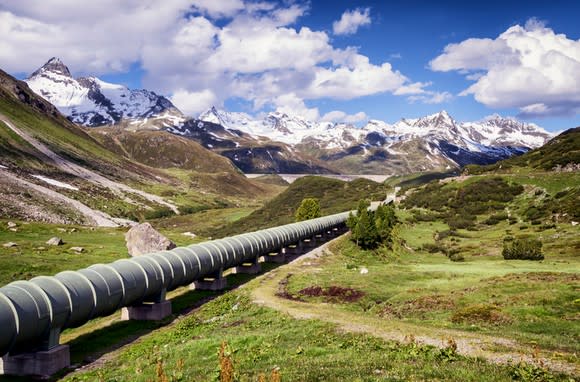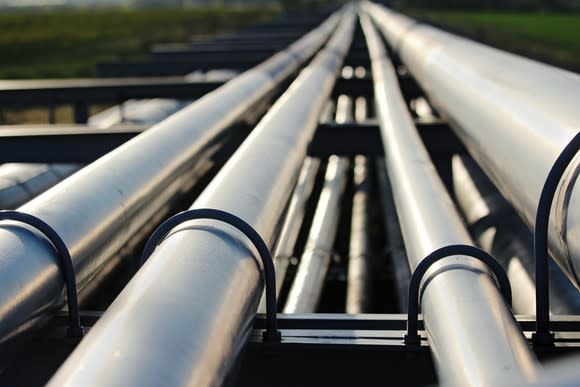Better Buy: Enbridge Inc vs. Kinder Morgan, Inc.
One of the most underappreciated trends of the last several years is also one of the most important for shaking up global trade and security: The United States will become a net energy exporter as soon as 2020. Perhaps people are still picking their jaws off the floor as they process the country's overnight ascension up the energy rankings. After all, less than two decades ago, any argument that achieving energy independence was possible in such a short time frame could have been laughed out of the room.
But energy security is a slam-dunk (the United States is already a net exporter of natural gas), especially when broadening the scope to include all of North America, and it represents an amazing source of opportunities for long-term investors.
Some of the most obvious companies to focus on are pipeline operators. They provide the infrastructure allowing energy production to make it from field to processing terminal to refinery to export facility. Plus, the fee-based businesses provide gobs of cash flow and predictable operations for shareholders. And two of the most obvious pipeline operators to focus on are Kinder Morgan (NYSE: KMI) and Enbridge (NYSE: ENB). Which of these stocks is the better buy?

Image source: Getty Images.
The matchup
The share price may not reflect it, but Kinder Morgan has been on a roll lately. North America's leading pipeline manager made good on its promise to boost the distribution 60% in 2018. It also swiped away one of the largest sources of uncertainty facing its growth prospects: the severely delayed Trans Mountain Pipeline that will prove critical to exporting crude oil from Canada's western coast.
Part of the reason the project was delayed is that it faced significant pushback from environmental groups, so Canada swooped in to acquire the pipeline for $3.5 billion and ensure its completion. Cash is good, but the Trans Mountain Pipeline comprised the bulk of Kinder Morgan's future earnings growth in the backlog. What happens now? The pipeline operator is working on a slew of smaller but valuable growth projects and should deliver a more concrete plan on the post-Canada expansion strategy to shareholders soon.
While that could change previously disclosed expectations for how capital will be deployed, the core business is still poised to deliver strong results in 2018. Kinder Morgan previously expected to maintain a net debt to adjusted EBITDA ratio of 5.1 and generate $568 million in discounted cash flow after paying for growth projects.
Losing the Trans Mountain Pipeline could have an effect in the long term, though. Kinder Morgan intends to grow its dividend 25% annually through 2020. That would represent a dividend yield of 7.4% at the current share price. There's also $1.5 billion remaining on a $2 billion share repurchase program. Whether or not smaller growth projects -- or a big splash acquisition -- can replace the $850-million-per-year earnings boost expected from the Canadian pipeline extension and deliver on previously stated goals in the same time frame remains to be seen.

Image source: Getty Images.
Enbridge is similarly well-positioned to capitalize on booming energy production and exports in North America. The Canadian pipeline operator generates 96% of all revenue in fee-based contracts and pays out 65% of income streams to shareholders, which leaves ample cash flow for capital investments. In the first quarter of 2018, that amounted to $2.3 billion in distributable cash flow, only $860 million of which was needed to fund the quarterly payout.
That's good news because Enbridge has $16.9 billion in growth projects stuffed in its backlog that need financing. If the business continues to execute and build out infrastructure, then it could grow cash flow per share and its dividend 10% per year through 2020. Management is also poking around several potential growth projects that could fuel growth beyond 2020.
That said, the Canadian pipeline operator faces its own sources of strategic uncertainty. The company recently offered $8.86 billion to acquire the outstanding shares of its four subsidiaries in a stock-for-stock transaction. Enbridge may have to pony up a bit more to get the deals approved by each company's board, as the offer doesn't represent a premium to current share prices. In the long run, the mammoth deal makes sense, as the tax advantages of master limited partnerships have evaporated with new corporate tax rates and regulatory decisions. In the near term, there are some unanswered questions.
One of the more important questions is how the company will make good on its promise to deleverage the balance sheet. The business's relatively high level of debt has been a primary factor driving down the share price in the last year, which has ironically made Enbridge stock pretty cheap on a cash flow basis. In addition to asset sales that have already been named, one move that could be announced in 2018 is the sale of its midstream business, which it's looking to unload for around $3.5 billion. Perhaps unsurprisingly, Kinder Morgan's Canadian subsidiary is a prime candidate, especially after receiving a $3.5 billion windfall for its Trans Mountain Pipeline, which it will be keen to replace with new income streams.

Image source: Getty Images.
By the numbers
Both Kinder Morgan and Enbridge face uncertainty in their near-term strategies. While that has weighed on each pipeline stock in 2018, the underlying businesses remain strong and predictable. How do they compare on selected financial metrics?
Metric | Kinder Morgan | Enbridge |
|---|---|---|
Market cap | $37.3 billion | $53.3 billion |
Dividend yield | 5% | 6.5% |
Forward PE | 17.8 | 17.0 |
12.6 | 13.3 |
Data source: Yahoo! Finance.
The table above is too close to call. However, Enbridge's 6.5% dividend yield does stand out, especially if it can make good on its promise to grow the payout at a 10% annual clip for the next few years.

Image source: Getty Images.
The better buy is...
Both pipeline operators are solid investments for long-term investors. Kinder Morgan and Enbridge each offer a stable and predictable business, steady growth, and a way for investors to own an important global trend. Forced to choose just one, the better buy would be Enbridge.
It owns a massive backlog of growth projects ($16.9 billion) compared to its smaller peer ($5 billion). A combination of strong cash flow and non-core asset sales should allow the company to self-fund a healthy amount of the capital requirements. While there are questions regarding its proposed acquisition of its subsidiaries, Enbridge stock's nearly 20% slide in 2018 presents a better buying opportunity for investors.
More From The Motley Fool
Maxx Chatsko has no position in any of the stocks mentioned. The Motley Fool owns shares of and recommends Kinder Morgan. The Motley Fool owns shares of Enbridge. The Motley Fool has a disclosure policy.

 Yahoo Finance
Yahoo Finance 